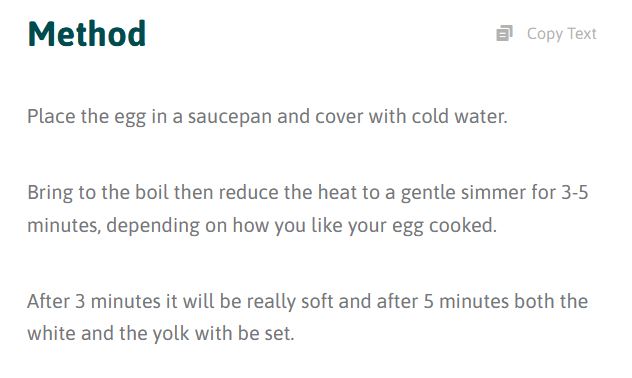
Want to know the optimal word count for a piece of SEO content? It’s as long as a piece of string.
There is no right answer because it’s not the right question. The right question to ask is whether the piece of content delivers on its promise to search users.
If it doesn’t then it really doesn’t matter how long or short the piece of content is, Google will dismiss it for failing to provide a good user experience.
This article looks at content length and the mythical relationship between word count and SEO. It explains why this dangerous myth persists and how focussing on word counts can end up costing you time, money and rankings.
But first, let’s get one of the more persistent myths out of the way:
Think Size Matters? Google Doesn’t.
Google has made it quite clear that your content’s word count is “not a ranking factor”.
Sometimes a short piece of content is more than enough to rank on its own, provided the page meets its purpose and serves user intent.
Case in point, this is currently the top-ranked site on Google in Ireland for the search term, “How to boil an egg.”

It’s barely 80 words.
But it’s clear, concise and perfectly matches user intent. Plus it’s from an authoritative source (the Irish food board) so it ranks #1.
Now let’s compare that with another page I found recently. I was researching how to fix an old MacBook of mine, trying to gauge how much work would be involved when I came across this behemoth of a page:
It’s the top result for “replace MacBook pro battery 2015”

Big difference. It has a word count of 4,097 and well over a hundred images.
But that’s because opening up an old Mac laptop and changing the battery is a far more complicated task than boiling an egg, with considerably more steps involved compared. (Which is why I haven’t attempted it yet.)
Boiling The Egg Not The Ocean
So do you think creating an image-intensive 4,097-word article on “how to boil an egg” will help you steal the top position for that search term?
Of course not, that would be ridiculous. And who in their right mind would want to read it?
More importantly, what kind of a demented masochist would want to actually write it?

And yet, projects like this are not uncommon with unfortunate freelancers being paid pennies, or fractions of pennies, by agencies to churn out long-form content that’s of zero value to the public.
Do the writers take the time to research the topics carefully or plan out each point before taking great pains to edit their work?
Of course not.
Instead they hammer out cookie-cutter content full of quick cliches and lazy metaphors. All that matters is hitting that all-important word count threshold so they can mark it done and move on to the next piece.

And readers notice.
You can always tell when a writer has zero interest in the project they’re working on.
Instead of sharing your passion for the brand, you end up with content that shrugs in the corner going, “I really don’t want to be here.”
They write on autopilot, taking every opportunity they can to pad out the piece with unnecessary verbiage.
So instead of impactful prose and short concise sentences, you get aimless, meandering text that offers nothing of value to users. Just long, frustrating intros and tangental paragraphs of pointless filler with lots of unnecessary details or irrelevant information added in as an afterthought.
997, 998, 999… 1,000 words done!
Meanwhile you’re being billed for every single wasted word of it.
So run screaming from any content marketing agency that insists on charging you per word for long-form filler content.
Instead of focussing on word counts and playing the measuring game, look at your competitors’ topics. Ask yourself; what topics do they cover well? What topics do they not cover at all?
And most importantly of all, ask yourself, “what I can do better?”
Demolishing The Skyscraper
So why this obsession with word counts in the first place?
Blame us SEO guys.
It all stems from a commonly-misunderstood SEO strategy known as the Skyscraper Technique.
The technique was pioneered by Backlinko’s Brian Dean, a prominent influencer within the SEO community.

In a nutshell, it stated that, since Google always wants to reward the most helpful pages, your goal should always be to create the the “ultimate resource” on any given topic.
You could achieve this by combining all the knowledge your competitors have, seeing what information they don’t have, filling in that knowledge gap, adding some unique information of your own to build it up higher and combining it all onto a single “everything you need to know about X” type page.
The aim is to one-up all your competitors in a single stroke by building your “skyscraper” higher.
Unfortunately many SEOs misconstrued this to mean “we need to make all our pages bigger and longer than our competitors”.
And so the word count wars began.
Of course you can’t turn a bungalow into a skyscraper. Nor should you.
That’s not to say you can’t build on an extension later – but just make sure you’re always adding value, not just words.
The Content Cattle Mart
Another contributing cause to the word count wars is a widespread misunderstanding as to what constitutes “thin content”.
Thin content does not mean content with low word counts. It has nothing to do with quantity.
Thin content means content that’s light on quality. It’s content that’s lacking in purpose, content that that offers little or no valuable information to users.
Knowing that important distinction will save you a lot of time, effort and money.
One popular SEO agency tactic is to crawl a client’s website, identify pages below a specific word count threshold and then flag all those pages as “thin content.”
Their solution? Creating filler content to bump up the word count.
But that’s a quantity over quality approach, like a farmer who fattens up a cow before taking it to the market.
Sure, there’s a chance it might work in the short term. Until your rankings get butchered.
100% Prime Content – All Meat, No Filler
The opposite of thin content isn’t fat content. It’s nutritional content, healthy content with meat on its bones.
Sometimes a short piece of content is just a short piece of content. If it delivers on its promise to users then its word count is irrelevant.
Writing words for the sake of words is counterproductive. The whole process wastes time and money and won’t help you rank. If anything it will hurt your rankings in the long term.
Here’s how Google views it:
“some site owners attempt to improve their pages’ ranking and attract visitors by creating pages with many words but little or no authentic content.”
[Source]
Note the word, “authentic”.
Google doesn’t want more long-form articles rehashing the same topics over and over.
They want you to be you.
The SEO skyline is cluttered with wanna-be “skyscraper” builders trying to rank with the same basic information. You can cut through it all and rise above them by providing something new.
So take an alternative approach, challenge the conventional wisdom, do your own research, conduct your own studies, publish your own statistics.
Provide the public with unique, authentic content that provides true nourishment and of course…
Make Your Content Easy To Digest
Brevity is at the heart of good writing.
And this is especially important when writing for the web.
In all likelihood you haven’t actually read this article from start to finish, you’re just skimming. That’s right I just caught you scrolling – hi there!
Web content works in a very specific manner. Most people see the headline, read the first paragraph and then skim down until they find the information they want.
That’s why you must get to the point at the beginning and have a consistent structure throughout the piece that makes it easier to digest.
Reading on a screen is uncomfortable and most people don’t have the time to read long, unbroken articles that are padded out with pointless fluff.
They want specific information as quickly as you can provide it.
And this is what all your content needs to be focused on.
Word Counts Are Costing You Money

By focusing on word counts you negatively affect your SEO.
You dilute the message, reduce its impact, suffocate your readers and increase the likelihood of confusion.
You also run the risk of high bounce rates and lost revenue, because your visitors have lost patience.
Nobody should have to wade through long paragraphs of pointless filler to find the information they need.
Instead the answers they seek should jump out of the page at them triggering them to take the desired action – be that sharing your content with friends, getting in touch with your sales team or purchasing a product directly.
In other words, it’s not the length of your content that matters, it’s how you use it.

